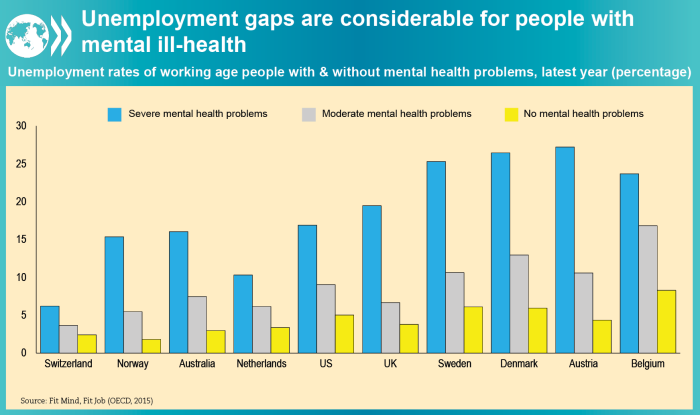Employment
Mental Health and Work
|
Tackling mental ill-health of the working-age population is a key issue for labour market and social policies in OECD countries. OECD governments increasingly recognise that policy has a major role to play in keeping people with mental health problems in employment and helping them to perform at work, in bringing those outside of the labour market into it or back to it, and in preventing mental illness at all ages including youth and adolescence. Recommendation of the OECD Council The OECD has developed a set of policy guidelines for an integrated approach to address the impact of mental health problems on health, education, employment and social outcomes. These guidelines were adopted in December 2015 and published in January 2016 as the OECD Recommendation of the Council on Integrated Mental Health, Skills and Work Policy. |
|
|
Time to act on mental health The costs of poor mental health are high: the total cost of mental illness is estimated at around 3.5% of GDP. People with mild to moderate mental illness, such as anxiety or depression, are twice as likely to be unemployed. They also run a much higher risk of living in poverty and social marginalisation. The facts are clear: it’s time to act. |
|
POLICY BRIEFS AND WORKING PAPERS
-
Tackling the mental health impact of the COVID-19 crisis: an integrated, whole-of-society response (May 2021)
- Supporting young people’s mental health through the COVID-19 crisis (May 2021)
- Mental Health and Work: Achieving Well-integrated Policies and Service Delivery. This working paper gives examples of policy initiatives from 10 OECD countries for integrated services and presents outcomes and strengths and weaknesses of the policy initiative
Key publicationS
- Fitter Minds, Fitter Jobs - From Awareness to Change in Integrated Mental Health, Skills and Work Policies (November 2021)
This report complements a legal document prepared by the OECD on the implementation of the Recommendation five years after its adoption, and adds quantitative evidence to it as well as considerations about the implications of the experiences during the COVID-19 pandemic on future versions of the Recommendation. Policy is in flux in most countries but much more will have to be done to implement the principles and fulfil the promises of the Recommendation. - Fit Mind, Fit Job - From Evidence to Practice in Mental Health and Work (March 2015)
This report provides a synthesis of the findings of the OECD’s four-year review. It concludes that a transformation is required in policy thinking about mental health and work and sets out the key elements for an integrated policy approach to promoting better mental health and employment outcomes. - Sick on the Job? Myths and Realities about Mental Health and Work (January 2012)
The costs of mental ill-health for the individuals concerned, employers and society at large are enormous. Mental illness is responsible for a very significant loss of potential labour supply, high rates of unemployment, and a high incidence of sickness absence and reduced productivity at work. In particular, mental illness causes too many young people to leave the labour market, or never really enter it, through early moves onto disability benefit.
COUNTRY REPORTS
This series of reports is looking at how the broader education, health, social and labour market policy challenges are being tackled in a number of OECD countries.
Ten countries reports are published:
| Australia | December 2015 Austria | October 2015 Belgium | January 2013 Denmark | February 2013 Netherlands | December 2014 |
New Zealand | December 2018 Norway | March 2013 Sweden | March 2013 Switzerland | January 2014 United Kingdom | February 2014 |
events
- OECD Wellbeing and Mental Health Conference (December 2021)
- OECD Forum Series 2021: Working It Out: Mental Health & Employment (November 2021)
INDICATORS AND data

Contact US
Please contact us at: [email protected]
 Follow us on Twitter @OECD_Social
Follow us on Twitter @OECD_Social
Related Documents